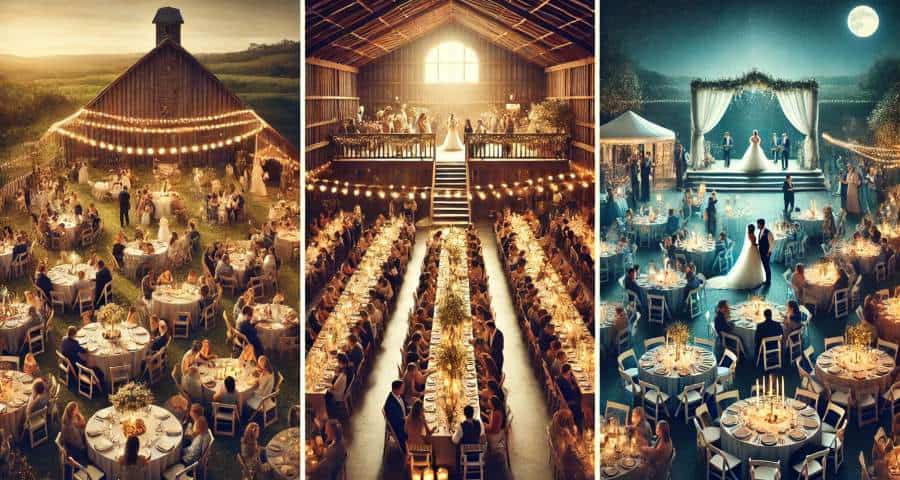Choosing the right size for your wedding is a deeply personal decision that depends on your budget, your vision for the day, and the type of experience you want to create.
While it might seem like a simple choice, there’s actually a lot to think about to make sure your wedding day feels just right.
This decision affects everything from how much you’ll spend to the overall feel of the event.
Pros and Cons of Different Wedding Sizes

Whether you’re dreaming of a small, intimate gathering or a grand celebration, each wedding size has its own unique set of advantages and challenges.
Intimate Weddings (Under 50 Guests)
Pros:
- Personal Atmosphere: With a smaller guest list, you can create a more personal and intimate atmosphere. You’ll have more time to spend with each guest, ensuring that everyone feels valued and included in your celebration.
- Lower Costs: Fewer guests generally mean lower costs, from catering and venue expenses to invitations and favors. This can allow you to allocate more of your budget to other elements, like a more luxurious honeymoon or higher-quality photography.
- Greater Flexibility: Smaller weddings often offer more flexibility in choosing a venue, as you’re not constrained by large capacity requirements. This opens up possibilities for unique locations such as a family home, a small boutique hotel, or even a scenic outdoor spot.
- Less Stress: Easier to plan and manage with fewer moving parts.
- Quality Over Quantity: Opportunity to splurge on premium experiences for a select group.
Cons:
- Tough Decisions: With a limited guest list, you may face tough decisions about who to invite. This can lead to difficult conversations with family and friends who might feel left out.
- Less Festive Atmosphere: Some couples may feel that a smaller wedding lacks the festive energy of a larger event. If you’re hoping for a lively dance floor and a big celebration, a small wedding might feel too subdued.
- Fewer Gifts: If this is a consideration, smaller weddings typically result in fewer presents, though this is balanced with lower costs.
Medium Weddings (50-100 Guests)
Pros:
- Balanced Atmosphere: A medium-sized wedding strikes a balance between intimacy and festivity. You can still create a warm and personal environment while enjoying the lively atmosphere that comes with a larger group of people.
- More Inclusive Guest List: With a guest list in this range, you have the flexibility to invite a broader circle of friends and family without overwhelming your budget or the venue. This allows you to include more people who are important to you and your partner.
- Manageable Logistics: Medium-sized weddings are typically easier to manage logistically than larger events. You’ll still need to be organised, but the planning process is usually less complex than for a very large wedding.
- Reasonable Costs: More economical than large weddings but with more options than small ones.
Cons:
- Budget Considerations: While a medium-sized wedding is often more affordable than a large one, costs can still add up quickly. It’s important to keep a close eye on your budget and prioritize what matters most to you.
- Potential for Compromises: You may find yourself having to compromise on certain elements, such as the venue or catering options, to accommodate a medium-sized guest list within your budget.
- Less Personalized Interaction: With more guests to entertain, you may find it challenging to spend meaningful time with each person, which could leave some guests feeling overlooked.
- Harder to Cap: Guest lists can easily creep up, pushing into large wedding territory.
- Middle-Ground Challenges: May lack the intimacy of small weddings or the grandeur of large ones.
- Venue Limitations: Some venues might be too small or too large for this size.
Large Weddings (Over 100 Guests)
Pros:
- Grand Atmosphere: A large wedding can create an incredibly festive and celebratory atmosphere. If you envision a lively dance floor, grand décor, and a big party vibe, a large wedding will deliver.
- Wide Circle of Friends and Family: A large wedding allows you to include extended family, distant relatives, work colleagues, and a wide circle of friends, ensuring that no one feels left out. This can be particularly important in cultures where inviting the extended community is a significant part of the celebration.
- Networking Opportunities: With more guests, there’s a greater opportunity for mingling and networking. Guests can meet new people, reconnect with old friends, and enjoy the social aspects of a large gathering.
- More Gifts and Well-Wishes: Larger attendance often means more presents and support.
- Traditional: Aligns with certain cultural expectations for big, family-oriented celebrations.
Cons:
- Higher Costs: Large weddings come with a significantly higher price tag. From catering and venue costs to décor and entertainment, everything is scaled up, which can put a strain on your budget.
- Complex Logistics: The logistics of planning a large wedding can be overwhelming. Managing a large guest list, coordinating with multiple vendors, and ensuring everything runs smoothly on the day requires careful planning and organisation which can make it more stressful.
- Less Personal Interaction: With so many guests, it’s nearly impossible to spend quality time with each one. Some guests may feel like they only received a brief greeting, which can detract from the personal connection you might want to share with everyone present.
- Limited Venue Options: Fewer locations can accommodate very large groups.
Factors to Consider When Choosing Your Wedding Size

Choosing your wedding size isn’t just about deciding how many people to invite, it involves balancing various factors that play a role in shaping the type of wedding you will have.
- Budget Constraints: The number of guests at your wedding has a direct and significant impact on the overall budget. Understanding these cost implications is crucial. Decide on a budget early in the planning process, and let it guide the size of your guest list.
- Venue and Catering Costs: These are often the largest expenses, and they scale with the number of guests. A larger guest list means a larger venue and more food and drinks.
- Decorations and Rentals: More guests require more tables, chairs, linens, and centrepieces, increasing your costs proportionally.
- Invitations and Wedding Favours: Costs for invitations, save-the-dates, and wedding favours will increase with each additional guest.
- Venue Capacity: Your choice of venue can significantly influence or even dictate your wedding size.
- Size Limitations: Each venue has a maximum capacity, which can be a deciding factor if you’re torn between a larger and a smaller guest list. Ensure the venue you love can accommodate the number of guests you plan to invite.
- Ambiance: Consider the space’s layout. A venue that’s too large for your guest list can feel empty and cold, while one that’s too small can be cramped and uncomfortable.
- Location and Accessibility: The venue’s location might also affect your decision. A destination wedding, for instance, might naturally limit your guest list due to travel constraints for your guests.
- Family Expectations and Dynamics: Family can play a significant role in deciding your wedding size.
- Cultural Expectations: In many cultures, weddings are large family affairs where excluding people isn’t an option. Understanding and integrating these cultural expectations is crucial.
- Family Pressure: Sometimes, families have strong opinions about who should be invited. Navigate these dynamics carefully to honour your loved ones while still making choices that reflect your preferences.
- Personal Preferences: What type of wedding do you envision? Your personal preference is perhaps the most crucial factor:
- Intimate vs. Grand: Do you prefer a quiet, intimate setting where you can spend time with each guest, or a large, bustling celebration full of energy?
- Guest Interaction: Consider how much personal interaction you want with your guests. Larger weddings often limit the amount of time you can spend with each person.
- Cultural Considerations: Cultural norms and traditions can influence your wedding size in significant ways:
- Traditional Expectations: Some cultures have traditions that include large community gatherings, which can dictate a larger guest list.
- Modern vs. Traditional: Balancing modern personal desires with traditional expectations can be challenging but is necessary for many couples.
How the Size of your Wedding Impacts the Experience

Choosing the right size for your wedding plays a crucial role in shaping the overall atmosphere and experience of your special day. Whether you desire an intimate, personal celebration or a grand, lively event, the number of guests will significantly influence the day’s feel for both you and your attendees. Making this decision early and thoughtfully can help ensure your wedding meets your expectations and reduces potential stress.
- Intimacy and Atmosphere:
- Small weddings create a more personal atmosphere, allowing meaningful interactions with each guest.
- Large weddings offer a vibrant, festive feel but may limit personal interactions with attendees.
- Venue and Logistics:
- Fewer guests allow for a greater choice of unique venues and easier logistics.
- Larger weddings may need more conventional, spacious venues and involve complex logistics like transportation and accommodation for guests.
- Budget Considerations:
- A smaller guest list generally means lower overall costs, allowing you to allocate funds to other elements like luxury details or a more extravagant honeymoon.
- Larger weddings require a bigger budget, with costs scaling up for venues, catering, and decorations, potentially leading to compromises on some aspects.
- Guest Experience:
- Guests at smaller weddings often enjoy a more personalised and memorable experience.
- In larger weddings, while the atmosphere is more dynamic, the personal connection with each guest may be diluted.
- Stress and Coordination:
- Smaller weddings typically involve less stress and simpler coordination.
- Larger weddings, with their complex logistics and more extensive vendor management, usually require more detailed planning, possibly involving professional planners.
- Memorability and Impact:
- The intimate nature of small weddings often leaves a lasting impression on both the couple and their guests.
- Large weddings are memorable for their scale and the grand spectacle they offer, though they might lack the personal touch of smaller gatherings.
- Family Expectations and Dynamics:
- The size of the wedding can be influenced by family expectations and dynamics, especially if the family is contributing financially.
- Navigating family expectations and finding a balance between intimate and large-scale celebrations can require delicate negotiations.
- Cultural Considerations:
- Some cultures expect large weddings with extensive guest lists, while others may lean towards more intimate gatherings.
- Balancing cultural expectations with personal preferences is essential, and even in smaller weddings, important cultural elements can be incorporated to honour heritage while maintaining intimacy.
How to Determine Your Ideal Wedding Size

Deciding on the size for your wedding can feel like a balancing act between personal desires, budget constraints, family expectations, and guest experience. Here are some steps to help guide you in determining the ideal number of guests for your special day, ensuring it aligns with your vision and practical realities.
- Consult with Your Partner: It’s crucial to ensure that you and your partner are on the same page. Begin with an open discussion about each person’s ideal wedding scenario. Encourage honesty and openness about what each of you values most for the wedding day. Clearly identify any major differences in expectations, whether they’re about the scale of the wedding, the guest list, or the style of the event.
- Assess Your Vision and Priorities: Imagine how your ideal wedding feels. Do you see a cosy gathering with close friends and family, or a grand celebration? What aspects of your wedding are most important? Is it the venue, the food, the music, or the people who attend? List your priorities to see which factors will be most affected by the size of the wedding.
- Set Your Budget: Create a detailed budget that includes estimates for different scales of weddings. Consider how the number of guests impacts costs like catering, venue, and decorations. Establish a clear budget that reflects your financial limits and priorities. This will help you avoid overspending and focus on what truly adds value to your wedding.
- List Your Non-Negotiables: Start by listing out the components that are critical to your wedding’s success. These might include specific traditions, guest experiences, or particular settings that are important to you and your partner. Some must-have elements might be more suitable for a smaller, more intimate setting, such as a family-only ceremony. Others might thrive in a larger, more dynamic environment, like a grand banquet hall that supports a lavish reception.
- Draft an Initial Guest List: Drafting an initial guest list gives you a starting point to evaluate who you want to include in your celebration. By having a rough headcount, you can start touring venues and see which ones can comfortably accommodate your expected number of guests and to see if that number can work with your budget.
- Consider Your Venue Options: Selecting the venue not only sets the tone and atmosphere for your wedding but also significantly influences the size of the guest list you can accommodate. This is because each venue will have a maximum capacity, which is often dictated by fire codes and layout configurations. With your initial guest list in mind, check if your preferred venues can accommodate your expected number of guests. If a venue is too small for your initial list, you’ll need to decide whether to cut back on guests or look for another venue.
- Evaluate Family Expectations and Cultural Factors: Family can play a significant role in the size of your wedding, especially if they are contributing financially. Discuss openly with family members who have expectations or obligations. Some cultures have specific expectations regarding wedding sizes. Recognize these traditions and decide how or if they should influence your wedding planning.
- Think About Guest Experience: Reflect on the level of interaction you wish to have with your guests. Smaller weddings often allow for deeper, more personal connections, while larger weddings can provide a vibrant, festive atmosphere. Evaluate the comfort and accessibility of your planned event from a guest perspective. Consider travel logistics, accommodations, and the venue’s capacity to host the number you have in mind comfortably.
- Consider Long-Term Satisfaction: Reflect on how you will look back on this day in the years to come. Will you regret not inviting certain people, or feel relieved that you opted for a smaller, more intimate gathering? Making choices that align with your long-term emotional well-being is crucial. This includes considering how the size of your wedding aligns with your personal values and the quality of experiences you want to share with your guests.
- Be Flexible and Ready to Adapt: Circumstances can change, such as venue availability or budget adjustments. Be prepared to adapt your guest list size as needed. If adjustments are necessary, communicate them clearly and promptly to guests and service providers.
Remember, there’s no “right” size for a wedding. The ideal size is one that aligns with your vision, budget, and values while also considering practical constraints and the feelings of those close to you.
Common Wedding Size Dilemmas

Planning a wedding is exciting, but it can also bring unexpected challenges, especially when it comes to determining and managing your guest list. Here are some common wedding size dilemmas and strategies to help you navigate them smoothly.
- When You and Your Partner Disagree on Wedding Size: It’s not uncommon for couples to have different visions of their ideal wedding size. One might dream of an intimate gathering, while the other envisions a grand celebration. Here’s how to find middle ground:
- Open Communication: Discuss your reasons for wanting a particular wedding size. Understanding each other’s perspectives is crucial.
- Compromise: Consider a medium-sized wedding that incorporates elements you both want.
- Two-Part Celebration: Have a small ceremony followed by a larger reception, or vice versa.
- Prioritise Together: Make a list of must-have guests and work from there to find a size you both feel comfortable with.
- Handling Last-Minute Guest List Changes: Whether it’s unexpected additions or last-minute cancellations, changes to your guest list can be stressful.
- Build in a Buffer: When planning, allow for a small percentage of flexibility in your numbers.
- Communicate with Vendors: Keep your caterer and venue informed of any significant changes.
- Have a B-List: Create a secondary list of guests to invite if you have cancellations.
- Be Clear on RSVP Deadlines: This helps minimise last-minute surprises.
- Adjusting Your Wedding Size Due to Unexpected Circumstances: Sometimes, external factors like venue changes, budget constraints, or even global events can force you to adjust your wedding size. Here’s how to adapt:
- Prioritise Your Guest List: Decide who absolutely must be there and who you could potentially celebrate with later.
- Communicate Clearly: If you need to reduce your guest list, be honest and empathetic in your communication.
- Explore Virtual Options: Consider including some guests virtually if in-person attendance isn’t possible.
- Dealing with Uninvited Guests: It’s an awkward situation when someone assumes they’re invited to your wedding when they’re not.
- Be Honest: Explain your situation clearly and kindly. Most people will understand.
- Offer Alternatives: Consider inviting them to a pre or post-wedding celebration instead.
- Stand Firm: Once you’ve made your decision, stick to it to avoid setting a precedent.
- Plus-One Policies: Deciding on a plus-one policy can be tricky, but having a clear stance can help manage your guest list effectively
- Set Clear Criteria: Decide on specific rules for plus-ones. For example: Only married, engaged, or long-term couples. Plus-ones for wedding party members only. Plus-ones for guests who won’t know many others at the wedding.
- Be Consistent: Whatever policy you choose, apply it consistently to avoid hurt feelings.
- Communicate Clearly: Address invitations precisely to show who is invited. For example, “Mr. John Smith and Guest” versus just “Mr. John Smith.”
- Handle Exceptions Gracefully: If you make an exception, be prepared to explain your reasoning if asked.
- Budget Considerations: Remember that each plus-one essentially doubles the cost for that invitation.
- Children at Weddings: The decision to include or exclude children can significantly impact your wedding size and atmosphere.
- All-Inclusive vs. Adults-Only: Decide whether you want an all-ages celebration or an adults-only event.
- Age Limits: If you’re including some children, consider setting an age limit (e.g., over 12 only).
- Immediate Family Exception: Some couples choose to only include children who are immediate family members.
- Clear Communication: Clearly state your policy on the invitation. For example, “Adults-only celebration” or “Children welcome.”
- Provide Alternatives: If not inviting children, consider offering childcare options or having a separate kids’ area at the reception.
- Be Prepared for Reactions: Some guests, especially those travelling from out of town, might not be able to attend without their children.
- Consider Your Venue: Some venues may have restrictions or special requirements for events with children.

